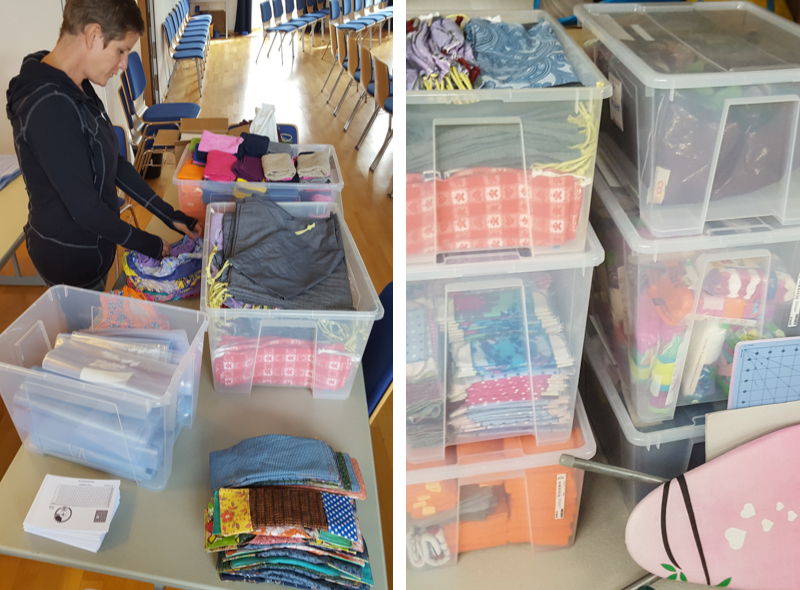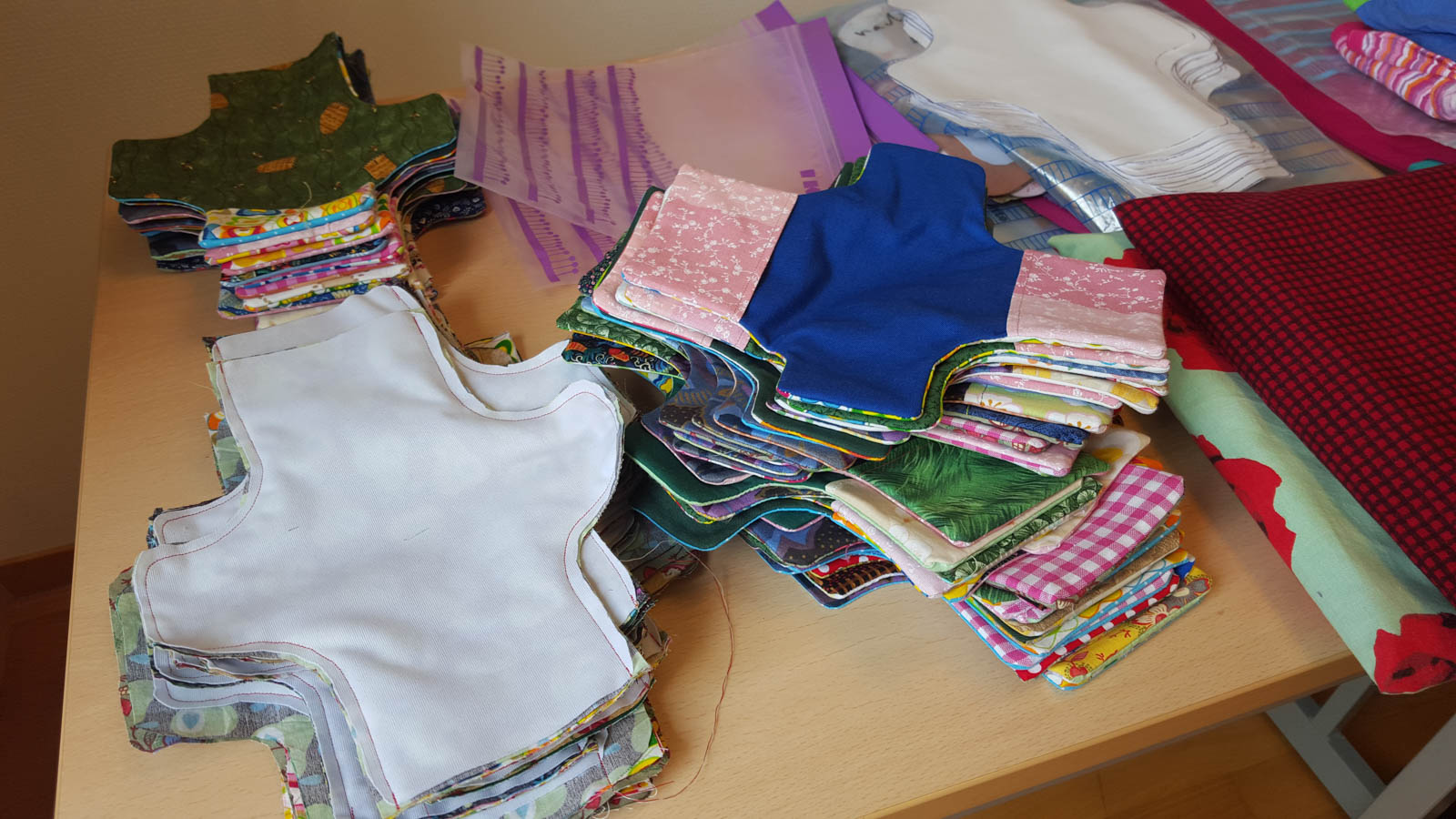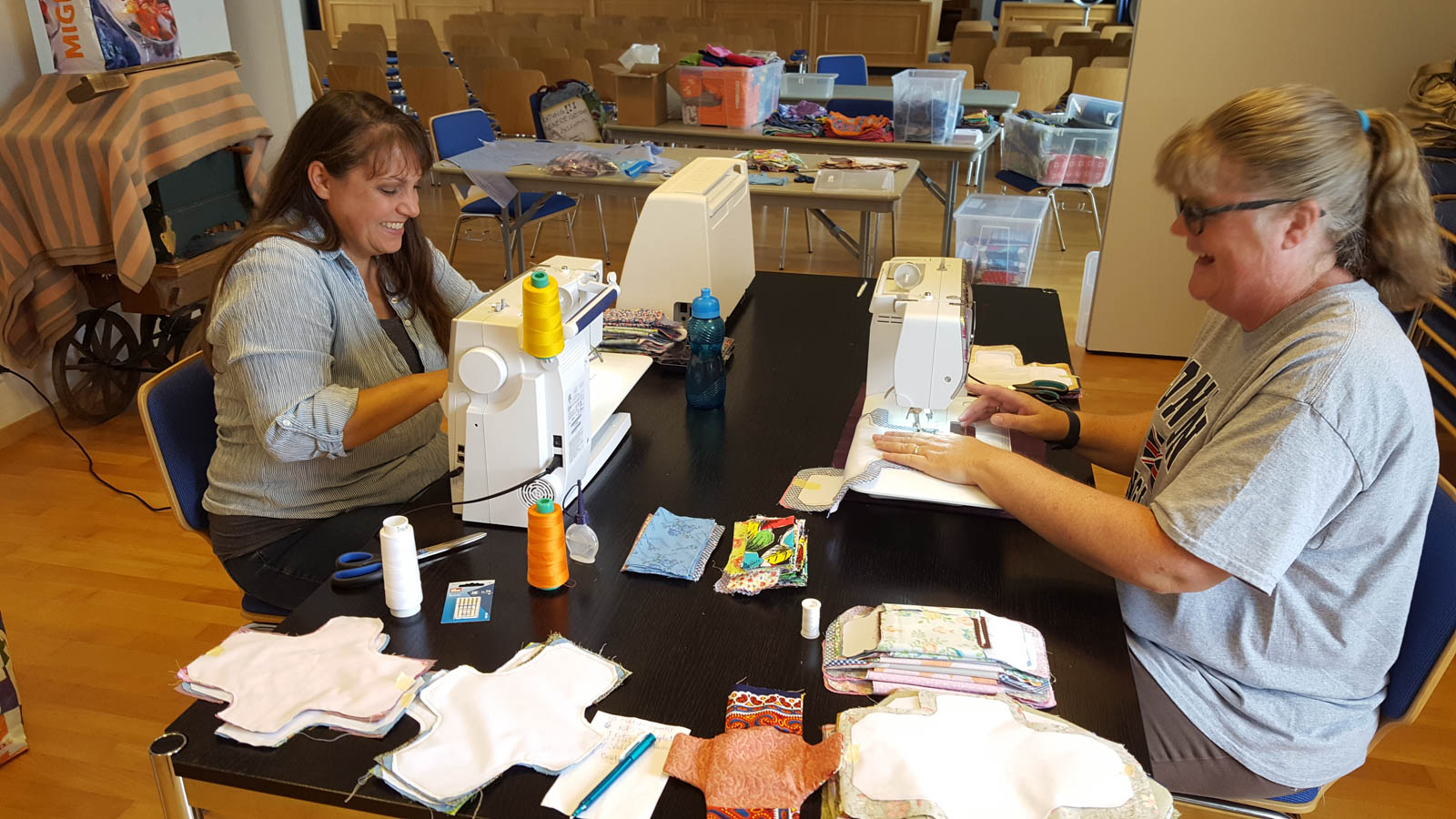Helping Out: Days for Girls
Living in a developed country like Switzerland, we take a lot of things for granted: clean water, education, and free time, to name a few. But one thing we rarely discuss is feminine hygiene, which affects millions of women and girls around the world every month. Over the past two years, I’ve learned quite a bit on this topic through volunteering with the Days for Girls organization, which provides reusable feminine hygiene supplies and health education to women and girls in developing countries.
How I got involved
When I was 17, I inherited several huge boxes of quilting fabric when my mother died of cancer. The first time I took inventory, I had a good long cry, wondering what projects and plans my mother had for all this beautiful fabric she had collected over the years. She had been expecting a long future of sewing keepsakes for her children and grandchildren. Instead, her dreams were collecting dust in my cellar, while I was too sentimental and indecisive to use any of it.
When my friend told me about the Days for Girls project, I immediately thought of these boxes, full of potential. It has been therapeutic to empty the boxes and cut up all those precious meters into useful bits. Since each kit requires many steps to make, I would occasionally see one of my fabrics passing through another’s hands, joined with fabric donated from many other generous people, sorted and separated into different piles, on its way to help in its own tiny way. I know my mother would approve.

A monthly problem
Women and girls in developing countries face many difficulties managing their monthly periods. Many cannot find or afford feminine hygiene supplies and therefore resort to using leaves, rags, twigs and other materials that are ineffective and often lead to infection. Some traditional cultures still shame and isolate menstruating women, for example, forcing them to live in animal stalls during their periods, not allowing them to prepare food, not allowing contact with other people. These practices not only demoralize these women and girls, but also cause them to miss work and school, making it even more difficult for them to improve their economic situations.
Every school day matters to her. Without a solution to manage their monthly cycle:
1 in 10 girls in Sub-Saharan Africa
113 million adolescent girls in India
30% of girls from rural areas of Brazil…
will miss school this year.– from Days for Girls website
This topic is becoming more popular in the media and I encourage you to read more here.
NPR – People Are Finally Talking About The Thing Nobody Wants To Talk About
The Guardian – We need to talk about periods: why is menstruation still holding girls back?
How Days for Girls is helping
The worldwide Days for Girls organization is committed to providing sustainable feminine hygiene to those most in need. The organization relies on thousands of volunteers to make feminine hygiene kits, distribute these directly to women and girls in developing countries, provide health education on site, and train locals to make and repair their own kits. So far, they’ve helped women and girls in 110+ countries and are on target to reach 1 million women and girls by the end of 2017.
Every girl and woman has inherent worth and dignity. Days for Girls celebrates this by providing sustainable feminine hygiene solutions and health education. When girls and women have health, education, and opportunity, communities and our world are stronger.
– from Days for Girls website
What is in a DfG Feminine Hygiene Kit?
Each girl or woman receives a 1 drawstring bag, 2 moisture barrier shields, 8 absorbent reusable pads, 2 pairs of panties, 1 washcloth, 1 travel-sized soap, 2 plastic freezer bags, 1 visual instruction sheet. This kit lasts about 3 years.

The kit design has evolved to the current form with feedback from thousands of women and girls using these kits on a regular basis, focusing on comfort, ease of maintenance, and acceptance into the local communities.
Though most kits are currently made by volunteers, Days for Girls is now training local women and girls to make the kids using local supplies and to sell the kits, providing economic opportunities as well.
Please see this official page for a description and pictures of a kit.
Many hands make light work
It takes a lot of work to produce each kit, but with many helping hands, we can get a lot of work done. Our Zurich-Bonstetten Days for Girls team meets about every two months to make and assemble feminine hygiene kits using donated fabric and supplies. Many women also work at home, completing whole kits or doing piecework, which can be later handed off to other volunteers for subsequent steps. So far, our group has made 800+ kits, representing the work of dozens of women, contributing a few hours here and there.
Every time I finish making a kit, I place it carefully in the stack and think for a moment of the women or girl who will receive it. This simple kit has the power to change her life for the better.
– Heidi, Days for Girls volunteer in Switzerland
Unlike many other volunteer opportunities in Switzerland, this project doesn’t require a long-term commitment or special skills. If you can trace, cut, iron, fold, sew, or simply stuff items into bags, we can use your help! If you can only come once, you are welcome!

Distributing the kits to women in need
The Zurich-Bonstetten team distributes kits mainly to Nepal. Unfortunately, any items sent through the mail rarely reach their destination, but instead end up on the black market. So we rely on individuals traveling to Nepal to hand deliver our kits to a small Days for Girls team in Nepal. This team works with local women to distribute the kits and provide health education so the women and girls there on how to use and care for the kits.
If you are traveling to Nepal or other developing countries and would be interested in delivering kits to the Days for Girls team, please contact us. Distribution is one of the biggest difficulties in this effort.
All helping hands welcome!
Of course, there are many worthy causes and volunteer efforts in Zurich. But if this project has piqued your interest, please contact our team and follow us on Facebook to be informed of upcoming sewing events. If you are interested in donating fabric or other supplies, please contact our team first to see what our current needs are.
Text and photos by Tanya Deans
Originally from California, Tanya has lived in Zurich since 2005. When she’s not sewing, she’s exploring Switzerland with her family, researching family hikes and travel tips to share on her website MomsTotsZurich.




